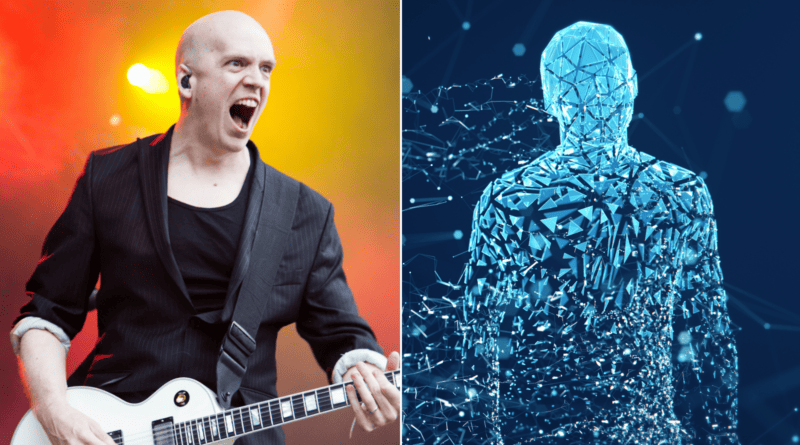For Devin Townsend, artificial intelligence isn’t something to be feared but rather accepted. The former Strapping Young Lad leader, also known for his work with Steve Vai back in the day, weighed in on the matter while appearing recently in a video interview with Sense Music Media.
“I think it’s [a] tool,” said Devin while replying to a question on what he thinks of the whole thing. “I think it’s a sophisticated algorithm more so than a messiah,” he added with a laugh.
Of course, at this point, there’s hardly any chance you’ll get an instant musical, visual, or any other form of masterpiece with a simple prompt. How far we’re from it — it’s really difficult to say. But for a musician like Devin, it’s just like another component in the creative process that can help you spark an interesting idea. And it’s in no way a “boogeyman,” as some may think of it today.
“I think that, as a tool, there’s a lot of use that I have for it that I think is creatively interesting,” he continued. “People tend to want to find the boogeyman and then focus all their inability to control anything else in their life on that as the primary thing we need to fear.”
And, according to Townsend, there’s no reason to fear it, especially knowing that it’s “inevitable.” He added:
“But, like anything else, fearing something inevitable is a lot of effort, and it IS inevitable, so I just use it. I’m like, ‘Oh, this works great for me.’ I have a lot of applications in which I find AI is really cool, like being able to visualize a concept visually, artistically through Midjourney or what have you, and being able to then say, ‘Oh, yeah, okay, that’s really cool.’ I love being able to see it in a sort of final form immediately.”
“And let’s refine it. Then, from there, for example, I can take it to my friend who builds puppets or sculptures and say, ‘Here’s a starting point.’ It doesn’t necessarily have to be exactly that, but for me, that saves a shitload of time, and it’s fun too.”
The process isn’t always yielding results. But Devin claims that he occasionally does get some decent results out of it:
“On a musical level, there’s a certain amount of AI and the algorithms that go into it that I find inspiring — like, I put things on with keywords, and then take that and orchestrate it, or jam with it. Sometimes it yields nothing, but other times it’s inspiring and it allows me to go down another avenue.”
In conclusion, Devin simply added that the fear shouldn’t limit any artist to try and use their skills in combination with these tools rather than simply avoid them:
“I think one should be wary of just fearing something that has as much potential as it does. But who knows, man? Maybe time will tell.”
Over the last year or so, there have been so many different takes on the AI in the music world. Probably the most in-depth analysis came from Rick Beato who addressed Universal Music taking down AI-generated music in style of Drake. Their actions, according to Beato, raise a lot of important questions:
“Okay, does Universal Music Group own this? Because this is created by someone else. This is an original composition. Are they saying they own Drake’s voice? Because if someone does a parody, or if they do an imitation of Drake, that’s fair use.”
But on the other hand, he wasn’t against AI. It’s an obvious evolutionary step for the industry:
“What’s going on with AI right now is exactly what happened when Napster came out in 1999. College kids started sharing MP3s, the labels didn’t know what to do about it, you had artists like Metallica suing people, everybody went insane, and the music business just completely fell off a cliff. And they really never figured out what to do until streaming, years later.”
However, Beato also gave somewhat grim predictions for the future of music and musicians. What is this going to mean for the creators of new music and who’s going to own the rights to someone’s voice or even musical style that’s generated using AI?
“AI is here to stay, whether it’s someone inputting Chris Cornell’s voice and having Layne Staley’s voice or Kurt Cobain’s voice or Eddie Vedder’s voice or Bing Crosby’s voice come out on the other side — that’s going to keep happening. And they’re going to be impossible to chase down, all of these.”
“The other thing that’s going to happen is that the artists are going to say, ‘I’m fine with this, I just want to get my 50% or 100% of it,’ or whatever. And they’ll fight with the record labels to who owns what. And there’s going to be Drake, and then Drake AI. There’s going to be The Beatles, and then The Beatles AI. This is going to be on Apple Music, it’s going to be on Spotify, it’s going to be everywhere. Jimi Hendrix, Jimi Hendrix AI, The Weeknd, The Weeknd AI… And people will accept these.”
And, in his opinion, this will come with major consequences:
“They are going to actually just get rid of the artists. They’ll make the money from Drake AI and The Beatles AI and whoever. But they’re going to make a bulk of their money, I predict, from fake artists, from AI artists. Because people don’t care. I’m sorry. Just like people don’t care whether they’re playing through a real amp or not. None of the young bands that I go out and see care. That’s going to happen.”
“But then you got things like Spotify and Apple Music. Now, Spotify is gonna be like, ‘Well, we’re the distributor of this.’ Unless UMG is putting out their own streaming thing. But Spotify basically has that, so does Apple Music. Okay, so Spotify is gonna be like, ‘Well, we don’t need the record labels for this. Why do we need the record labels? We’ll just put out our own AI artists. We have the distribution!'”


